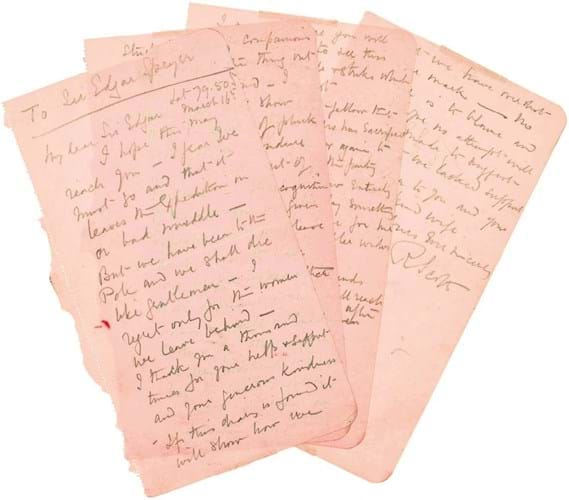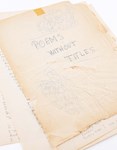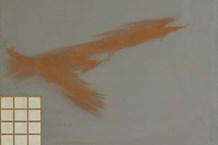A famous ‘farewell’ letter in the hand of the polar explorer Robert Falcon Scott was sold for £330,000 (a premium-inclusive £415,900) at Bonhams on November 22.
Addressed on March 16, 1912, to Sir Edgar Speyer, the expedition treasurer and a friend of Scott, it would seem to have been one of the earlier, and certainly one of the longest of his farewell letters to close friends, supporters and the relatives of those who had already died, or were soon to end their lives with him on the ill-fated British Antarctic Expedition of 1910-13.
The letter was originally presented by Speyer’s widow to Rear Admiral Richard Byrd – the famous US naval officer, aviator and polar explorer – at a dinner held in his honour in New York in 1935. Its first auction outing was at Sotheby’s in 1988. In a 2012 appearance at Bonhams bidding reached £135,000.
Thirteen Scott ‘farewell’ letters are recorded, though the locations of four are presently unknown – among them two that went to family members and one that he sent to the writer JM Barrie.
Of the other nine letters, six are held by the Scott Polar Research Library in Cambridge, one is in the British Museum and another in a New Zealand museum.
Where this one sold by Bonhams has gone to has yet to be revealed.
Final days
Written in pencil over four pages of his diary, shortly after Captain Oates had disappeared, and just days before the expedition tent was pitched for the final time, the letter was found with his body by the search party that, many months later, found their camp.
“…I hope this may reach you – I fear we must go and that it leaves the Expedition in a bad muddle – But we have been to the Pole and we shall die like gentlemen”, Scott writes before addressing the issues that most troubled him.
He thanks Speyer for his help, support and kindness and hopes that if his diary is found “…it will show how we stuck by dying companions and fought this thing out well to the end. I think this will show that the spirit of pluck and the power to endure has not passed out of the race…”
Scott also asks him to make sure their dependents are looked after. He says: “Wilson, the best fellow that ever stepped who has sacrificed himself again and again to the sick men of the party, leaves a widow entirely destitute, Surely something ought to be done for her”, before adding what nowadays would perhaps be seen as a rather condescending footnote, “…and for the humbler widow of Edgar Evans.”
He ends: “…We very nearly came through and it’s a pity to have missed it, but lately I have felt that we have overshot the mark – no one else is to blame and I hope no attempt will be made to suggest that we lacked support…”
He also tells of Titus Oates’ famous last words: “‘I am just going outside and may be some time.”
Scott, together with his remaining companions, Dr Edward Wilson and Lieutenant Henry Robertson ‘Birdie’ Bowers, had struggled onwards to within 11 miles of supplies of food and fuel awaiting them at One Ton Depot, but could go no further.
For eight days their tent was shaken by a gale-force blizzard. With the temperature at minus 40 degrees, Scott wrote letters of farewell to the two women who meant most to him, his wife and his mother, and to the wives and mothers of those who, like him, would never return.















